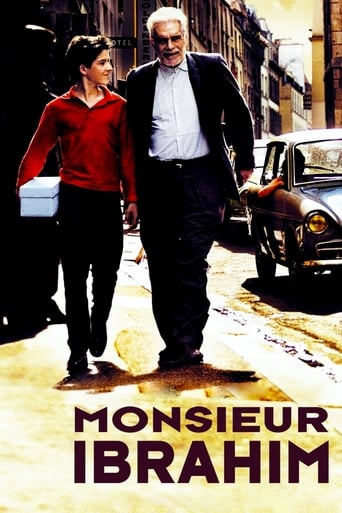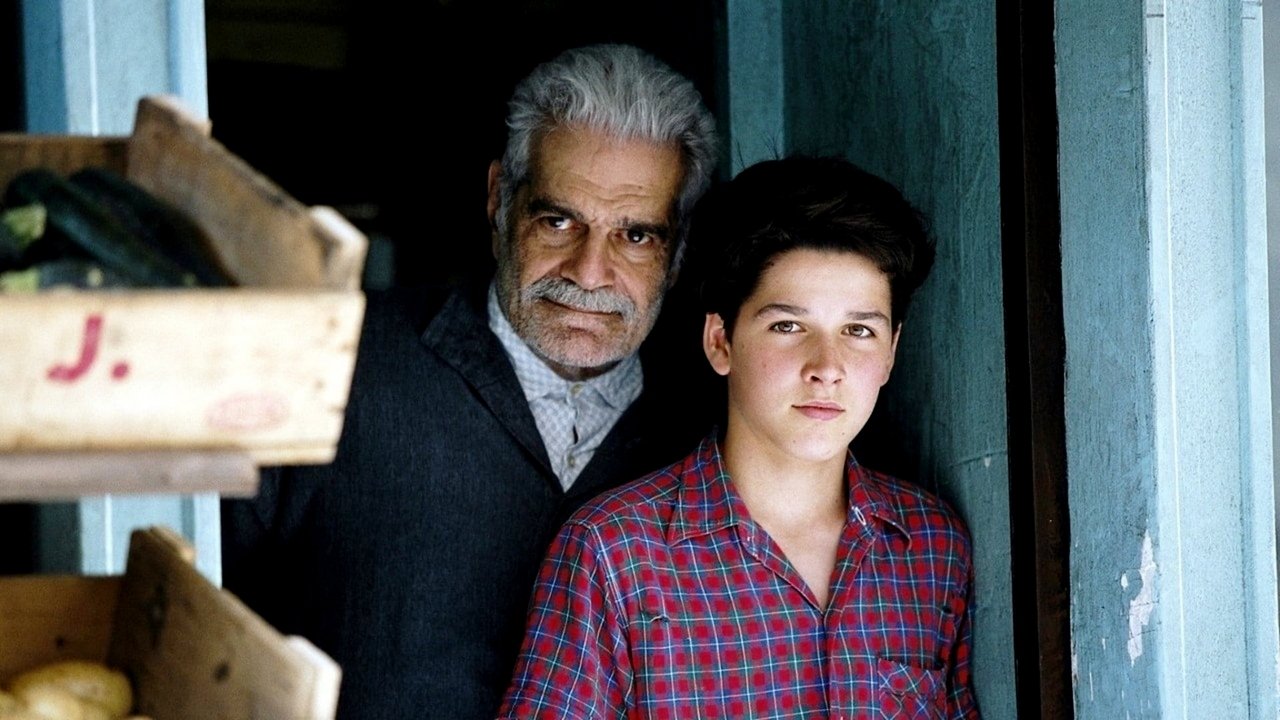Flagrant-Baronessa
In the first scene of the film, 12-year-old Moïse walks down the hot backstreets of Paris on Rue Bleue, summer sizzling in the background, and loses his virginity to a pretty prostitute. The same-titled novel by François Dupeyron opens also on this bold note, setting the blunt no-nonsense tone and approach for the story. It explores the friendship between young Moïse and old Monsieur Ibrahim "the Arab on the corner" and unlike the majority of French cinema, it makes no pretense about it. It is merely a gentle look at how two people cultivate an unlikely father-and-son relationship.Because Moïse is a Jew and Monsieur Ibrahim (Omar Shariff) is a Muslim, the film pins cultural contrasts and issues of tolerance somewhere in between them, juxtaposing their different personalities through the use of insightful dialogue (the observation about trashcans in different districts comes to mind). Yet for a film primarily about beliefs and outlooks, it never preaches or falls prey to moral messages, which is endlessly refreshing. It does, however, feature a lot of religious undertones throughout and by the time Ibrahim starts teaching Moïse about the Coran, you know the film is about to take a standpoint.Omar Shariff allegedly came back from retirement to do this low-key film and his dedication to the content shines through in his wonderfully charismatic performance; he is a Morgan Freeman buddy type character and he manages this good-natured persona with effortless conviction. Pierre Boulanger who plays the young boy Moïse is certainly less convincing not quite capturing the inherent loneliness or idealism of his character that explain why he seeks out prostitutes or befriends the "local Arab". Thankfully, Shariff more than makes up for the latter's lack of skill by being the propelling force behind their dynamic friendship.Although Monsieur Ibrahim et les fleurs du Coran is largely a character-driven little film, its style and cinematography are elegantly expressed clear-eyed and blunt at the same time as it manages to convey the dreamy steamy atmosphere of a hot summer day in Paris. Upon shifting to Middle Eastern setting, it features gorgeously striking dusty plains and mountains. A device for the dreamy tone is the consistent use of a particular 1960's song (the film takes place during the 1960's) which invests the whole film in an almost lyrical flow.There is little wrong with the film and I greatly appreciate the direct approach to story (only a few introspective moments), but it is so low-key that it becomes forgettable. It does not claim to be important, and therefore isn't. It isn't a memorable product and it does not always manage touching, which renders it unremarkable. 7 out 10
MartinHafer
The first half of the movie was not especially compelling--especially since so much of this concerns a very young appearing 16 year-old boy and his experiences in procuring prostitutes. While this may or may not bother the sensibilities of French audiences, I found it awfully sleazy and unengaging. The kid appeared about 13 or 14 and scenes such as him breaking open his piggy bank to get enough for a trick were quite strange.The second half of the movie, in contrast, was a sweet and engaging story about the young man and his relationship with a shopkeeper (Omar Sharif). When the boy's father dies, Sharif adopts the boy and takes him on a long road trip to his homeland of Turkey. The acting is good and the story unusual enough that it is worth a look.
Suhasini
I have one very general criticism of this movie. I'm just going to try and kind of argue it out as I write. Well, the style of the movie is quite light-hearted. But it also deals with quite serious subject matter. It has its funny, sad and touching moments but never has them in the extreme: poignant, hilarious or tragic moments. But, I hear you say, Momo's father leaving, is pretty tragic. So is Momo disowning his mother and Paul not being real and Ibrahim dying. I agree, they are very tragic, but none of them (except perhaps the latter) is made to really jerk the tears out of an audience. That is not their purpose in the film. Now, I don't think this is necessarily a bad thing at all: to have a light-hearted style for serious content. In fact, it's quite refreshing and matter of fact that way. And the film, I think, successfully uses this style. Except for one thing. All this serious stuff they deal with, it's just the background to the story. The real story is the friendship/ relationship between Ibrahim and Momo, and in the process all these additional strands of the story, which each could have easily become the main one, get kind of glossed over. Told quickly, without depth. And so in the process I find, that no story gets told very deeply at all. The real point is made yes, and in a subtle way, but we're still left (or I am left) with a few questions and a wee bit of emptiness. For example, I really wanted to know what Momo thought about Paul's apparent non-existence. But, it is never mentioned again in the film. We are just left to fathom out who was lying, as Momo is, but we don't get any feedback on what was a pretty important...thing (couldn't think of a word) in his life. I actually really liked this film, but the more I think about it, the more I find this fault bothering me. That nothing is explored to it's fullest. Even the build up of Ibrahim's and Momo's relationship is kind of rushed. And their trip to Turkey doesn't add all that much to the film. I appreciate the fact that this may be the director's strategy. On some days, the uneventful-ness of Blue Street is captured really well. But the trip to Turkey is kind of like a bunch of tourist shots. Well, I said I'd argue myself out. And I think I certainly went round in a few circles there. But, my main point was: I don't think so many seemingly momentous/dramatic events in Momo's life should have been put in, if they were going to be unexplored and redundant.
EAKY
This film is a wonderful example of how one can choose to be a victim or a hero in life! The abrupt start to the movie lets one see the boy's situation immediately. Using the grocery money given to him by his father, he goes searching for his first sexual experience among the prostitutes he observes from the window of his apartment. He is unsupervised, self-sufficient, curious and in desperate need of guidance. The shopkeeper who has been in this boy's life longer than the boy realizes, steps in to be the uplifting and guiding force for him. Initially, I felt a little troubled by the use of the two religions and putting one in a less-kind light. However, I realized that the viewpoint had nothing to do with the religion, rather with the person and how they chose to deal with their life. I will recommend this movie to many people!


 AD
AD


